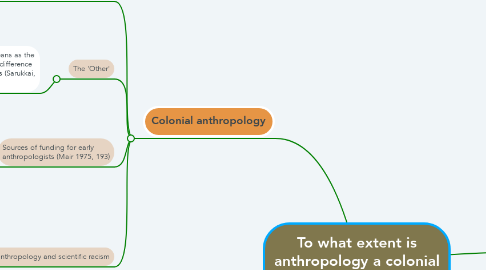
1. Colonial anthropology
1.1. Anthropological methodology
1.1.1. Fieldwork is only made possible by colonisation which allows anthropologists to enter and study colonised spaces (Pels and Salemink 1994, 17)
1.1.2. Even when colonised peoples seek to stiudy themselves, they must use colonial practices and frameworks (Pels and Salemink, 1994, 20)
1.2. The 'Other'
1.2.1. Anthropology places Europeans as the norm and seeks to describe difference and ascribe/justify hierarchies (Sarukkai, 1997, 1406)
1.3. Sources of funding for early anthropologists (Mair 1975, 193)
1.3.1. Colonial Social Science Research Council
1.3.1.1. Funded research on how to improve social conditions in colonised lands
1.3.2. International African Institute
1.3.2.1. Aim was to study African societies in order to guide the writing of colonial policy
1.3.3. Rockefeller Foundation
1.3.4. Universities
1.3.4.1. Themselves funded by colonialists
1.4. Physical anthropology and scientific racism
1.4.1. Craniometry - the study of skulls to find racial differences and scientifically justify hierarchies
1.4.2. Disproven by Franz Boas and other anthropologists but still maintains popularity among white supremacists
2. Early anthropologists
2.1. E.B. Tylor
2.1.1. Considered to be an 'armchair anthropologist'
2.1.1.1. Used colonist's diaries to carry out research
2.2. Bronisław Malinowski
2.2.1. Believed the study of 'primitive' African tribal cultures and their interactions with Europeans would lead to 'scientific control of Colonial co-operation' ( Fisher 1986, 6)
2.2.2. Theories and methods mainly used for government planning and studying colonised people, not looking critically at colonisers (Pels 1997, 166)
2.2.3. Infamous for diaries in which he revealed his true, bigoted beliefs about the peoples he studied
3. Decolonising anthropology
3.1. Anthropologists have moved from trying to improve colonial strategy, to shunning collaborating with colonial powers and working to support indigenous peoples instead (Pels 1997, 164)
3.2. Feminist anthropology
3.2.1. interested in how people resist and change oppressive structures (including colonialism) and how both are gendered (Walter 1995, 273)
3.3. Native anthropology
3.3.1. Studying the culture of one's own country, society or ethnic group (Steinlein 1990, 40)
3.3.2. E.g. Okot p'Bitek's work on his own Acholi people of Uganda
3.3.2.1. 'Here is the beginning of that presentation of African culture by Africans, for Africans, as well as for the world of foreign scholarship, without apology or dissimulation, for which we have been waiting so long' (p'Bitek 1971, introduction by Aidan Southall)
4. Key anthropologists
4.1. Franz Boas
4.1.1. Historical Particularism
4.1.1.1. Each society has its own unique history and specific development, so should be studied individually rather than comparing them all from a Eurocentric lens (Darnell 2013, 399)
4.1.2. Cultural Relativism
4.1.2.1. Not possible to understand someone's culture if you don't have lived experience of that culture, but can understand it relative to your own
